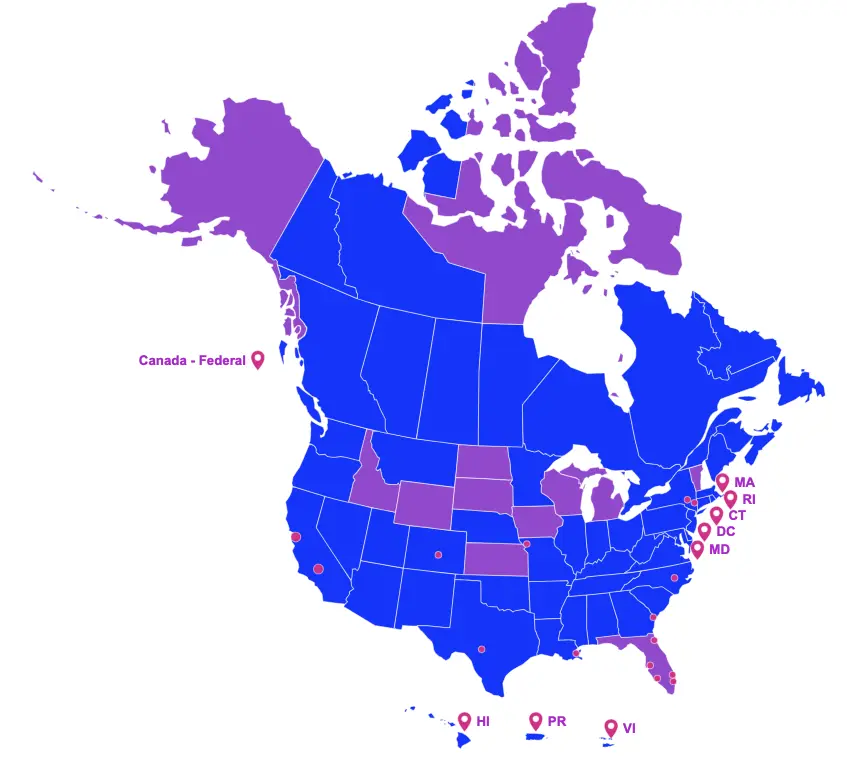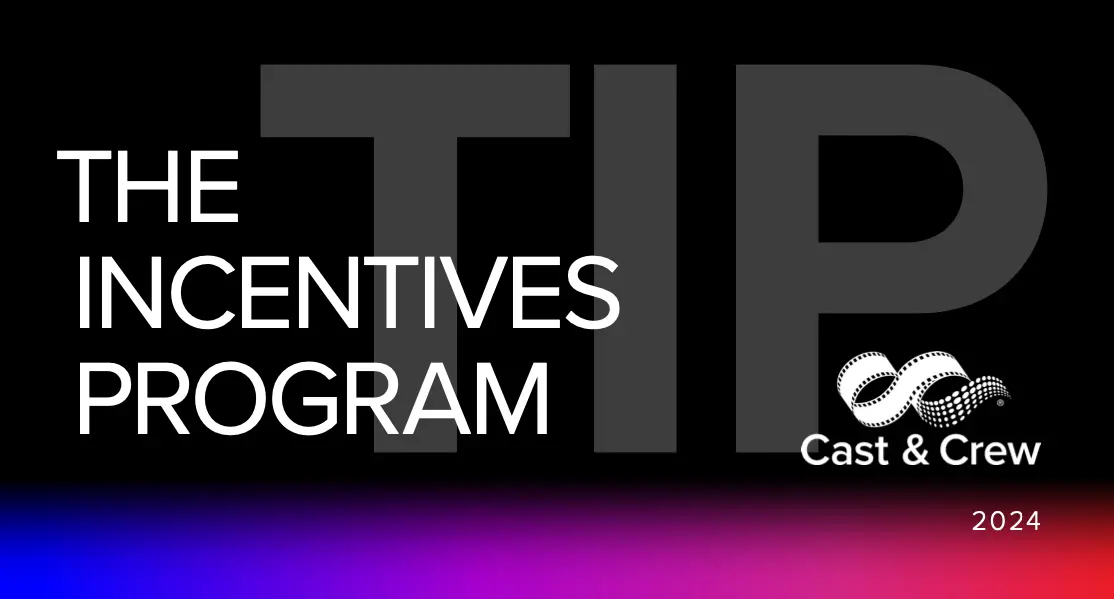THE INCENTIVES PROGRAM - TIP
A first look at our newsletter.
Cast & Crew Financial Services (CCFS) offers both U.S. and Canadian production incentive management services from setup to audit, as well as production incentive financing.
ENACTED LEGISLATION
Signed by the Governor
Georgia
On April 18, 2024, Governor Brian Kemp signed House Bill 1015, thereby reducing the tax imposed on individuals to 5.39%.
This Act will become effective on July 1, 2024, and be applicable to all taxable years beginning on or after January 1, 2024.
On April 18, 2024, Governor Brian Kemp signed House Bill 1023, thereby tying the loan out withholding rate to the rate of the tax imposed on individuals.
This Act will become effective on July 1, 2024, and be applicable to all taxable years beginning on or after January 1, 2024.
Nebraska
On April 23, 2024, Governor Jim Pillen signed Legislative Bill 937 into law, thereby amending the Nebraska Film Office Fund grant program for Nebraska filmmakers while also creating the Cast and Crew Nebraska Act for taxable years beginning on or after January 1, 2025. Details are as follows:
Cast and Crew Nebraska Act
- Establishes a refundable tax credit equal to 20% of qualifying expenditures;
- Provides for additional uplifts if any or all of the following conditions are met:
- 5% of qualifying expenditures if:
- The qualified production films Nebraska as Nebraska in Nebraska;
- Contains a minimum of 70% of the principal photography from the original submitted screenplay based in Nebraska; and,
- Includes a screen credit;
- 5% of qualifying expenditures directly attributable to a full-length qualified production, as defined, if:
- The qualified production activity films entirely in areas at least thirty miles from the corporate limits of a city of the metropolitan or primary class;
- 5% of wages paid to first-time, as defined, Nebraska resident actors or first-time Nebraska resident below-the-line employees (up to a maximum of ten) that are directly attributable to a full-length qualified production;
- 5% of qualifying expenditures if:
- Qualifies the 1st $500,000 of salary or wages paid to each resident above-the-line and each below-the-line;
- Above-the-line employee wages and related expenses are limited to not more than 25% of the total instate expenditures;
- Establishes annual funding of:
- $500,000 for the fiscal year (July 1 – June 30) 2025-2026;
- $1 million for any fiscal year thereafter;
- Establishes a per project incentive cap of:
- $500,000 for the fiscal year (July 1 – June 30) 2025-2026;
- $1 million for any fiscal year thereafter;
- Stipulates that a production company that receives tax credits under the Cast and Crew Nebraska Act shall not be eligible for a grant under subdivision (3) of section 81-1220;
- Requirements:
- Show that total expenditures for the qualified production activity are at least:
- $500,000 for a full-length film or made-for-television movie;
- $500,000 per over-the-air and streaming television programing episode; or
- $25,000 per short-length film, documentary, animation project, and commercial;
- For full-length films only at least ten days of production must be in Nebraska;
- For all other qualified productions at least 40% of the production days must be in Nebraska;
- At least 40% of the below-the-line employees must be Nebraska residents with expatriates included in the percentage but not exceeding 15% of the total below-the-line employees;
- At least 15% of the cast must be Nebraska residents with expatriates included in the percentage; and,
- Submit an application along with a nonrefundable fee of $500.
- Show that total expenditures for the qualified production activity are at least:
Nebraska Film Office Fund Grant Program
- Establishes a funding cap of $1,325,000 in any calendar year;
- Establishes a per project incentive cap of:
- $250,000 for a full-length film (at least 60 minutes in length) or documentary;
- $25,000 for a short-length film (at least 30 minutes but less than 60 minutes in length) or documentary;
- Requirements:
- Submit application prior to beginning production;
- See that the film tells a Nebraska story;
- 50% of workforce must be made up of Nebraska residents;
- 100% of the principal photography must take place in Nebraska;
- Applicant must be a resident of Nebraska that has a validated credit as a producer, director, director of photography, or screenwriter;
- Total budget must be at least:
- $50,000 for a full-length film or documentary;
- $5,000 for short-length films or documentary.
PROPOSED LEGISLATION
Still in the House or Senate
Hawaii
Senate Bill 795 proposes to amend the motion picture, digital media, and film production tax credit program by:
- Allowing the taxpayer to provide evidence of reasonable efforts to comply with all applicable requirements under title 14; and,
- Requiring that the taxpayer is given notice of and an opportunity to cure any failure to meet certain requirements within 30 days of receipt of the notice.
If enacted, this act shall take effect on January 1, 2025.
Illinois
Senate Bill 3180 proposes to amend the Child Labor Law for a child performer who works in a television, motion picture, or related entertainment production. Stipulating the maximum amount of time child performers may be at the place of employment within a 24-hour time period, as follows:
- Minors who have reached the age of 15 days but have not reached the age of 6 months, 2 hours max with not more than 20 minutes of work;
- Minors who have reached the age of 6 months but who have not attained the age of 2 years, 4 hours max with not more than 2 hours of work;
- Minors who have reached the age of 2 years but who have not attained the age of 6 years, 6 hours max with not more than 3 hours of work;
- Minors who have reached the age of 6 years but have not attained the age of 9 years, 8 hours max with not more than 4 hours of work and at least 3 hours of schooling when the minor’s school is in session;
- On days when the minor’s school is not in session, working hours may be a maximum of 6; and,
- Minors who have reached the age of 9 years but who have not attained the age of 16 years, 9 hours max with not more than 5 hours of work and at least 3 hours of schooling when the minor’s school is in session;
- On days when the minor’s school is not in session, working hours may be a maximum of 7 hours.
Michigan
House Bill 4907 and House Bill 4908 propose to restore the film incentive credit. Details are as follows:
- Establishes the following transferable tax credits:
- 25% of the qualified nonpayroll expenditures; or,
- 30% of the qualified nonpayroll expenditures if the qualified production includes an approved logo or marketing alternative;
- 10% of the qualified probationary Michigan vendor expenditures, as defined;
- 30% of the 1st $500,000 in payments and compensation made for each qualified resident;
- 20% of the 1st $500,000 in payments and compensation made for each qualified nonresident;
- Provides an additional 5% uplift on above tax credit rates if the applicant satisfies either of the following:
- Has qualified production expenditures or qualified probationary Michigan vendor expenditures that are attributable to a qualified Michigan vendor that is a minority owned business or woman owned business, a business owned by persons with disabilities, or a veteran owned business, as defined;
- Has qualified personnel expenditures attributable to employees who are members of a minority, persons with disabilities, or veterans;
- Limits the total number of applications that may be approved as follows:
- For qualified productions that are less than 20 minutes in duration or are commercial photography, not more than:
- $25 million in tax credits for each of the first 3 calendar years of the credit;
- $50 million in tax credits for each of the second 3 calendar years of the credit; and,
- $75 million in tax credits for each of the final 4 calendar years of the credit;
- For qualified productions that are 20 minutes or more in duration, not more than:
- $100 million in tax credits for each of the first 3 calendar years of the credit;
- $150 million in tax credits for each of the second 3 calendar years of the credit; and,
- $200 million in tax credits for each of the final 4 calendar years of the credit;
- For qualified productions that are less than 20 minutes in duration or are commercial photography, not more than:
- Establishes a per project incentive cap of 20% of the above annual amount allowed for that calendar year unless the office determines that a credit in excess of the 20% cap is in the best economic interest of this state;
- Stipulates that every applicant with an accredited production certificate shall, to the extent not withheld by a loan out company, deduct and withhold a tax in an amount computed by applying the rate prescribed in section 51 to the remainder of the payments made to the loan out company for the services of an individual in a qualified production after deducting from those payments the same proportion of the total amount of personal and dependency exemptions of the individuals allowed under this act;
- Requirements:
- Spend at least $300,000 in state for a qualified production that is at least 20 minutes in duration; or
- Spend at least $50,000 in state for a qualified production that is less than 20 minutes in duration or is commercial photography;
- Submit an application along with the following nonrefundable application fee:
- $1,000 if the qualified production is less than 20 minutes in duration or is commercial photography; or
- $2,000 if the qualified production is more than 20 minutes in duration;
- Requires a redemption fee equal to the greater of $500 or 1% of the credit claimed;
- Commence work in the state within 90 days of the date of the Accredited Production Certificate; and,
- Submit an independent certified public accountant’s report within 2 years of completion of the qualified production.
Minnesota
Senate Bill 5289 proposes to amend Minnesota’s Film Production Tax Credit program as follows:
- Exempts television commercials from including the Promotion of Minnesota;
- Removes the need for a Promotion of Minnesota to be approximately five seconds long and placed in the end credits before the below-the-line crew crawl; and,
- Reappropriates $500,000 from the film production rebate program to Explore Minnesota.
Rhode Island
House Bill 8180 and Senate Bill 3004 propose to amend the Rhode Island Motion Picture Production Tax Credit program as follows:
- Clarifies that “state-certified production cost” means any pre-production, production, and postproduction cost incurred and paid by a motion picture production company for the performance of services and use of property in Rhode Island for the production of a film, without limitation as to the person or business providing the goods or services, as long as services are performed in Rhode Island, tangible personal property is used in Rhode Island, and real property used by the motion picture production company is located in Rhode Island;
- Except as specifically required for music, legal or accounting services;
- Stipulates that a motion picture production company’s state-certified production costs may not be disqualified if:
- The vendor fails to register with the office of the secretary of state; or
- The vendor does not maintain a place of business in Rhode Island; and,
- Provides for the above definition to be applied to all state-certified productions, including state-certified productions aggrieved by the tax administrator’s denial.
This act would take effect upon passage.


